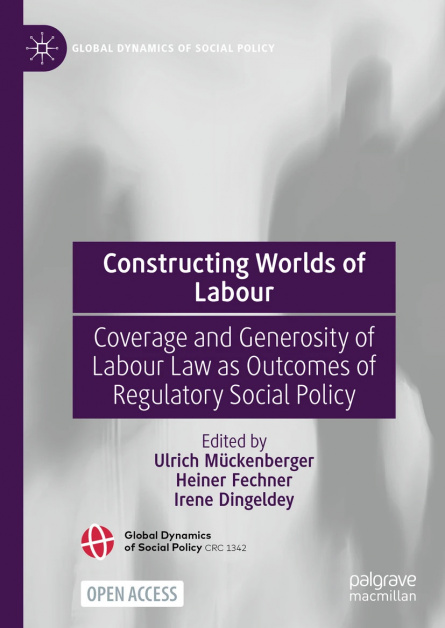
The volume is edited by the Principle Investigators Ulrich Mückenberger (labour and social security law and political science) and Irene Dingeldey (political science and labour market sociology) and the Postdoc Heiner Fechner (labour law, law and development and human rights) of the project "Worlds of Labour" (WoL), based on the work of the editors and of former and present project members, namely Marina Carlino, Jean-Yves Gerlitz, Jenny Hahs and Andrea Schäfer.
This open access book "Constructing Worlds of Labour" aims to break new ground in presenting results on different types of labour standards around the world as regulatory social policy. The particular topic is to make visible that, and to explain why, employment law world-wide has not only a protective role, but also a segmenting role – creating status, gender- and/or race-based hierarchical social differentiation. We conceptualised this role of law as legal segmentation and identified various historical, and power-related reasons for legal segmentation. We also identified how segmenting employment law interacts with segmentative implications of other (current and/or historical) legal institutions – such as social law, family law, tax law, but also slavery, gender-, race- and ethnicity-based legislation. As explanations not only path dependent institutional development, but also colonial influences, international organisations and epistemic communities including postcolonial thought are considered and made subject of in-depth investigations. The outcomes of research are vividly discussed in order to submit propositions on how to overcome the identified situation in the different worlds of labour. Hence, not only applying a global perspective, but also treading new paths in an interdisciplinary way – both theoretically/normatively and empirically –, makes this book outstanding.
The volume also intends to encourage a discussion of the concept, the methodology and the results by members of the scientific community. Chapters of Tzehainesh Teklè and of Simon Deakin discuss the use of leximetrics. Ludger Pries and Kerry Rittich also widen the scope of analysis. The former proposes a sociological view on the international arenas and actors of labour regulation. The latter lances a critical perspective on legal segmentation executed by legal factors beyond labour markets, beyond labour law and beyond the international institutions traditionally dealing with labour.
Contact:
Prof. Dr. Irene Dingeldey
Dr. Heiner Fechner
Prof. Dr. Ulrich Mückenberger













